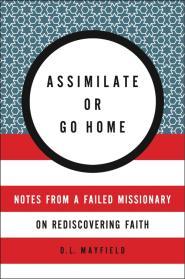It was six years ago that I had the opportunity to go to Pakistan, place of my childhood and land that I love, to work with displaced people. Massive floods had uprooted millions of people and Pakistan was feeling the after effects. Villages sat empty, every house unliveable because of water damage that had reached high on the walls. IDP* camps were full of people who already had so little - now they had lost the little they had.
Something happened to my heart the day that I saw a picture of Jacobabad, a place of one of my childhood homes, on the front page of the NY Times completely flooded. More than anything in the world, I wanted to go to Pakistan. I wanted to go help.
For many, this would seem brave. The Taliban had just attacked 36 trucks filled with fuel on the outskirts of Shikarpur - the place where I was headed. Pakistan was constantly front page news, not for anything good. For me, this wasn't about bravery. It was about longing. It was about place. It was about home.
You cannot grow up in a country where poverty greets you on every corner and the average monthly wage is $250 per month without being affected. This is your reality - a reality of disparities and poverty.
In the words of Danielle Mayfield, author of the new book Assimilate or Go Home, "long ago...I had been ruined for the ordinary"
Those two weeks in Pakistan were weeks that I will never forget. Honestly, what we did was small in the big scheme of things. But the trip set in motion a longheld desire to work with refugees and displaced people. I found that this desire was bigger than place, (although to begin this work in a place I considered home was wonderful.) The desire was bigger than me.
I came back to the United States and no one wanted to know about my trip. Not a single person asked about Pakistan. I was a package of defeat, humiliation, and dysentery. Here was a place and a work I cared about - and it didn't matter to my current, every day reality.
It didn't feel enough to be where I was. I wanted to be somewhere else. I wanted to make a difference. I wanted my life to count.
I wish D.L. Mayfield's book had been available at that time. Six years later, I had the privilege or reading this book and as I read, I found a kindred spirit.
On the surface, Mayfield's journey has stark contrasts to mine. But just below the surface, it's the same. She grew up as a nomad in her own country - the United States. Moving from place to place, she learned early what it is to be uprooted, what it is to start over. Mayfield also knows what it is to not really know the meaning of 'home.' She brings this into her journey of living side by side with refugees, learning the rhythms that define their lives in a new place, and through this, learning more about what it is to really understand that God loves you.
Those rhythms -anticipation, reality, depression, acceptance - are the way she tells her story. She writes "T he resettlement cycle is a loose, fluid look at how so many in our world are being asked to envision and forge new lives for themselves, and what a rocky journey it can be......There was and is something to the emotional arc that connected with me, the process of leaving the safety and security of my background and religion and being launched into the wilder territory of discovering the kingdom of God."
Mayfield's journey is initally about wanting to do big things and go faraway places. As she sees the world dropped into her neighborhood in the form of refugees, she realizes that the kingdom of God is not about doing big things. It's not about going exotic places. It's not about major conversions. The kingdom of God is about his love for our world, and us showing up to reflect that love; a love that turns everything upside down.
The book is about refugees, about communities that could not be more different than white America, about finding God in the margins and the broken. But mostly, it's about learning how much God loves you; how much he loves me. How much he loves each one of us, not for what we do, but for who we are.
Slowly, I found myself relaxing and resting in the love that D.L. Mayfield discovered, and then with surprise, I realized I could relax and rest in that same love for myself. It's only as we discover God's love for us that we truly have what it takes to embrace our broken world. It is only through understanding the deep love of God that we are equipped to do small things for the kingdom.


